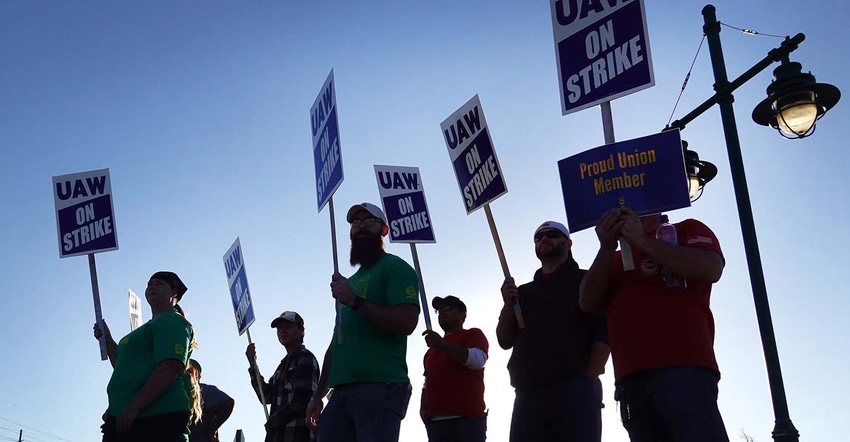UAW leaders reached an agreement, but workers balked and will stay on the picket line

By Alvaro Ledgard, Josh Eidelson and Joe Deaux
UPDATE: Deere & Co. said the new contract it provided to striking union employees is the company’s best and final offer, and they aren’t returning to the bargaining table.
The world’s largest maker of farm equipment said it remains in contact with the United Auto Workers union that represents workers, but that it has nothing else to bargain about. The comments come a day after workers voted down a second tentative agreement, extending the strike by some 10,000 workers into a third week.
“The agreement that we provided is frankly our best and final offer,” Marc Howze, chief administrative officer for Deere, said in an interview. “In order for us to be competitive we have gone as far as we’re gonna go.” Howze added that the company will not be going back to the bargaining table.
Members of the United Auto Workers union rejected a deal with Deere & Co., extending a nearly three-week-long strike and illustrating the growing willingness of U.S. workers to hold out for better terms.
The second rejected deal offered substantial improvements over one that workers turned down before going on strike, and included larger wage increases, no new tiers to retirement benefits and a signing bonus of $8,500.
“By a vote of 45% yes to 55% no, UAW John Deere members voted down the agreement this evening,” the union said in a statement. “The strike against John Deere and company will continue as we discuss next steps with the company.”
The rejection of the agreement demonstrates workers’ increased leverage amid a national labor shortage and strong demand for farm equipment. The wage increase offered at 14 Deere facilities was larger than nearly a dozen other collective bargaining agreements the UAW has negotiated since 2018, according to Bloomberg Law’s database of labor contracts.
“Thirty five years ago, workers at Deere lost a lockout and took a deal that froze and reduced wages,” said University of Chicago historian Gabriel Winant. “Today they rejected an offer that starts with a 10% raise. It’s the biggest downward shift in the economic balance of power in my lifetime.”
Some 10,000 Deere employees went on strike on Oct. 14 for the first time since 1986, having rejected a prior deal that called for a 5% to 6% wage increase for the first year.
Production and maintenance employees at 12 plants rejected the agreement, while workers at parts facilities in Denver and Atlanta approved a separate identical agreement, the company said in a statement.
“Through the agreements reached with the UAW, John Deere would have invested an additional $3.5 billion in our employees,” Deere said. “With the rejection of the agreement covering our Midwest facilities, we will execute the next phase of our Customer Service Continuation Plan.”
Other companies may see strikes
The number of U.S. workers on strike could grow substantially in the coming weeks if some of the tens of thousands of Kaiser Permanente healthcare workers who’ve authorized work stoppages walk off the job, or if Hollywood workers follow their Deere counterparts’ lead in rejecting a tentative deal negotiated by union leaders.
Deere shares, which have risen 32% this year, on Monday rose the most in eight months on news of a tentative deal. The consensus of analysts surveyed by Bloomberg estimate the company will report $10.6 billion in net sales from equipment operations when it reports fiscal fourth-quarter earnings Nov. 24.
The willingness of the union to hold out for a still-better deal is another sign that U.S. workers feel emboldened in pushing for better compensation as the economy emerges from the pandemic. The timing of the strike put further pressure on the Deere, coming as supply chain snags for semiconductors and other parts are already causing turmoil at a time of peak demand for tractors during the U.S. harvest.
The six-year contract that was rejected also included wage hikes of 5% in the third and fifth years, as well as lump-sum bonuses amounting to 3% of workers pay for the other three of the six-year contract. It also offered a $35,000 retirement bonus for workers with 10 to 24 years on the job and a $50,000 bonus for workers with at least 25 years.
Events surrounding the negotiation have been intense at times. Senator Bernie Sanders, a vocal proponent of labor unions, tweeted shortly after the strike started that “workers who spent years with the company are now being forced off their insurance.”
The company later issued a statement that it will continue providing health care for all striking union-represented production and maintenance employees.
--With assistance from Ian Kullgren, Andrew Wallender and William Jeremiah.
© 2021 Bloomberg L.P.
About the Author(s)
You May Also Like



